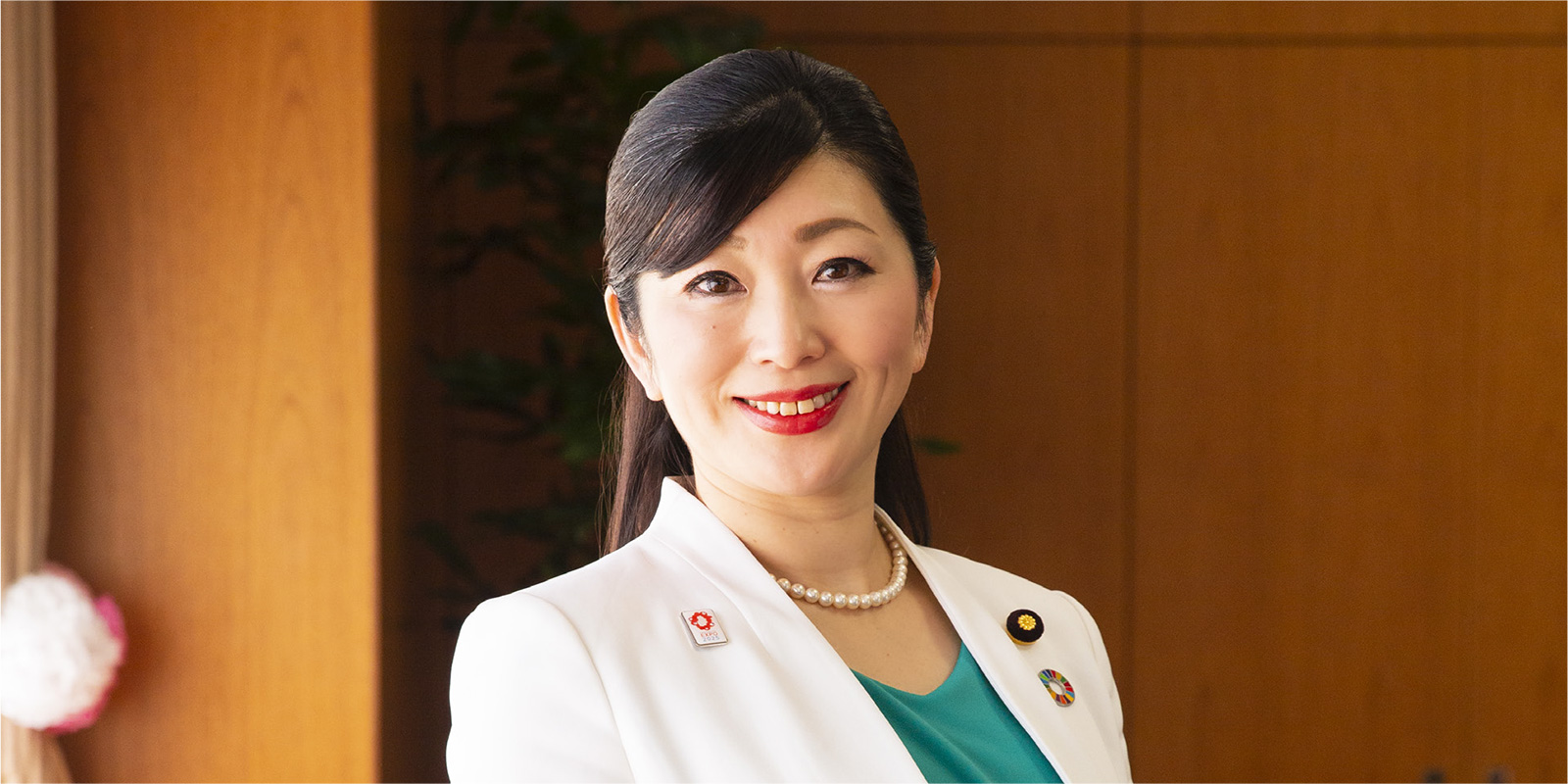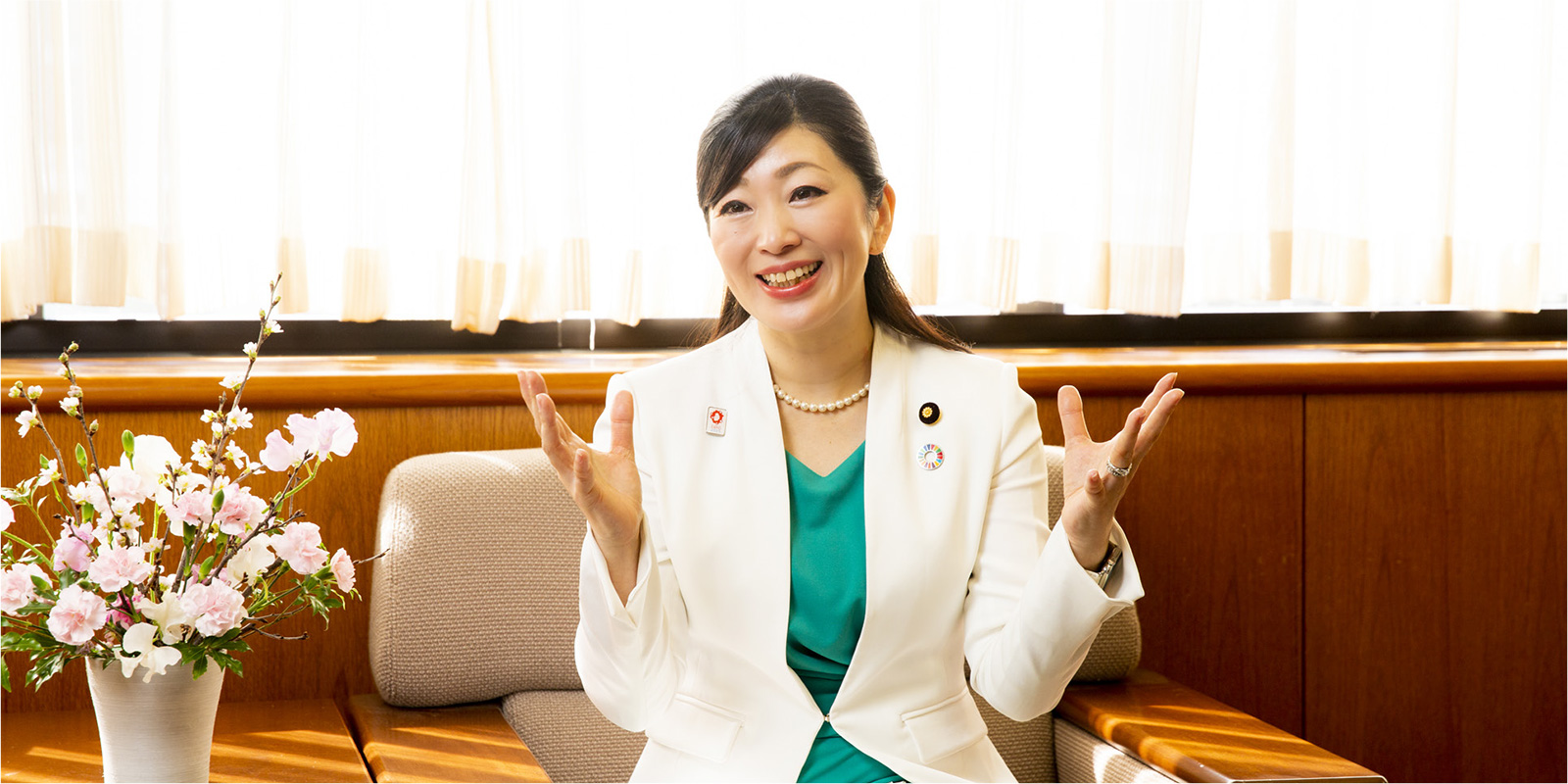All systems grow
Yumi Yoshikawa is on a mission. The Parliamentary Vice-Minister of Economy, Trade and Industry is tasked with turning around Japan’s economic prospects. She talks to Risa Shoji about how she plans to do it
“Japanese science and technology offers answers to the challenges societies are facing”
First elected to the House of Councillors in 2013, Yumi Yoshikawa is currently serving her second term in the upper house of the Japanese Diet. Representing Mie Prefecture and the ruling Liberal Democratic Party, she was appointed Parliamentary Vice-Minister of Economy, Trade and Industry in October 2021. Tasked with turning around an economy that was already slowing before the pandemic, Yoshikawa has plenty of work ahead. Central to her thinking is Expo 2025. Tasked with supporting Expo Minister Kenji Wakamiya as Parliamentary Vice-Minister of the Cabinet Office, another one of her many roles, Yoshikawa’s responsibilities include liaising with the private sector and promoting the Expo to an international audience. Here she unveils the steps she believes will get Japan’s economy back in the black.
“Japanese science and technology offers answers to the challenges societies are facing”
Make the most of the Expo opportunity
“[The Expo] will be an opportunity to show the world that Japanese science and technology offers answers to the challenges societies [are facing]. It’s a chance for the world to see what we have been working on. We should seize the opportunity to let the world know that Japan has technology and knowhow that’s been cultivated throughout its long history. Demonstrating that can lead people to want to invest in Japan, collaborate with Japan, and support Japanese technology.
The Expo is a place for demonstration, and a place to make new partnerships, initiate collaboration, and engage in co-creation with the rest of the world.”
 Yumi Yoshikawa | Keisuke Tanigawa
Yumi Yoshikawa | Keisuke Tanigawa
Build a smile economy
“I believe the true aims of science and technology are [to advance happiness], so we will once again harness them in order to achieve the SDGs [the UN’s 17 interlinked Sustainable Development Goals, designed to be a “blueprint to achieve a better and more sustainable future for all”] by 2030. The previous Osaka Expo in 1970 showcased the society of the future, and Expo 2005 in Aichi focused on the environment. There’s a grand philosophy for this Expo: It’s about our lifestyles and what happiness means to us, and what kind of society enables everyone to pursue their personal happiness, whatever that may be. It’s about things like how we can provide services and opportunities customized for each individual, rather than putting out uniform solutions that lead to unequal outcomes. The sum of these efforts will then be the happiness of society, the happiness of a country, and the happiness of the world. It may sound grandiose, but I hope this can be achieved through science and technology, and I would like the people of the world to become aware of this.”
Rethink how we care for the elderly
“In the area of nursing care, advanced technologies such as nursing robots and regenerative treatments have been developed in Japan because we’re one of the countries with the longest life expectancy and a frontrunner in issues related to the declining birthrate and aging population. These pioneering technologies can make life brighter for many, relieving the burden on both caregivers and recipients. In addition to promoting Japan’s various medical and pharmaceutical innovations, it’s important to shine a light on issues such as those I mentioned earlier, i.e. how to allow each individual to pursue happiness, how to provide tailor-made information, and how science and technology can make these things possible.”
 Shutterstock
Shutterstock
“As the overarching concern of our time, sustainability and the Sustainable Development Goals will of course be at the center of the Expo”
Embrace sanpo yoshi
“As the overarching concern of our time, sustainability and the SDGs will of course be at the center of the Expo. That is very significant, since in my opinion these ideas are highly compatible with the way things have been done in Japan for centuries. In the history of Japanese business, the principle of sanpo yoshi, or having transactions benefit not only the buyer and the seller but society as a whole, has always been prominent. ‘Society’ in this sense can be taken to mean the local community, the surrounding region, a country, employees and other stakeholders, and the environment. [The notion] that profits should be used to benefit the greater good is a time-honored but very topical idea.
Concepts such as ESG [environmental, social and governance] investment and the SDGs have only been around for a few decades, but the ideas behind them have been practiced in Japan for a very long time. When we look at various indicators, some say that Japan has fallen behind the rest of the world on sustainability, but the mindset [of sustainability] is deeply ingrained in our culture and has provided the foundation for business and social progress for hundreds of years. It’s just a matter of communicating that to the world, while of course doing our best to catch up with some of the present standards.”
 Shutterstock
Shutterstock
Fuse real-world and virtual experiences
“The Expo will be a showcase for new technology, which could include ‘flying’ cars to handle transportation from airports to the venue or unmanned aircraft to transport food and materials. In terms of energy, the venue will be designed to be carbon-neutral, with electricity generated using hydrogen and ammonia—technologies that Japan is a leader in.
“People will be able to ‘visit’ the Expo site from a distance, or participate virtually by utilizing metaverse-like functions”
On the other hand, we are aiming for a fusion of the virtual and the physical, so hopefully people will be able to ‘visit’ the Expo site from a distance, or participate virtually by utilizing metaverse-like functions. This has never been done before, but it’s important from a diversity perspective, since it would allow people with disabilities or other physical limitations [who are unable to make it to the real-world venue] to experience the Expo. In addition, as we still don’t know what the situation will be like with the pandemic [in 2025], a virtual Expo would allow everyone to participate even if travel [from certain places] isn’t possible.
“People will be able to ‘visit’ the Expo site from a distance, or participate virtually by utilizing metaverse-like functions”
In any case, I hope that people from all over the world who come to visit the Expo in person will be able to experience Japan’s traditions, culture, nature, food, and history, and that it will be an opportunity for them to visit not only the Expo site but also other places in Japan. For example, my home prefecture of Mie is just a short distance from the Expo venue. We have Iga, the home of the ninja, Ise Shrine, and the Kumano Kodo, a World Heritage Site. Mie also has beautiful nature, with the clear water of the Miya River attracting canoeists from around the world, a wealth of traditional craftsmanship, and world-class cuisine such as lobster, abalone, Matsusaka beef, and Ise green tea.”
Be inclusive
“Team Expo 2025 is an initiative that anyone can participate in. We are inviting children, students, nonprofits and other organizations, everyone to submit their ideas for a co-creative society, the society of the future. As of the end of last year, we’ve already received more than 500 entries. [Collaboration] will allow for the pursuit of happiness for the world as a whole, or rather the pursuit of happiness for each and every person, no matter what country they are from. I hope that people everywhere will take an interest in Expo 2025 and join us in building a happier and more sustainable society.”
 Yumi Yoshikawa | Keisuke Tanigawa
Yumi Yoshikawa | Keisuke Tanigawa